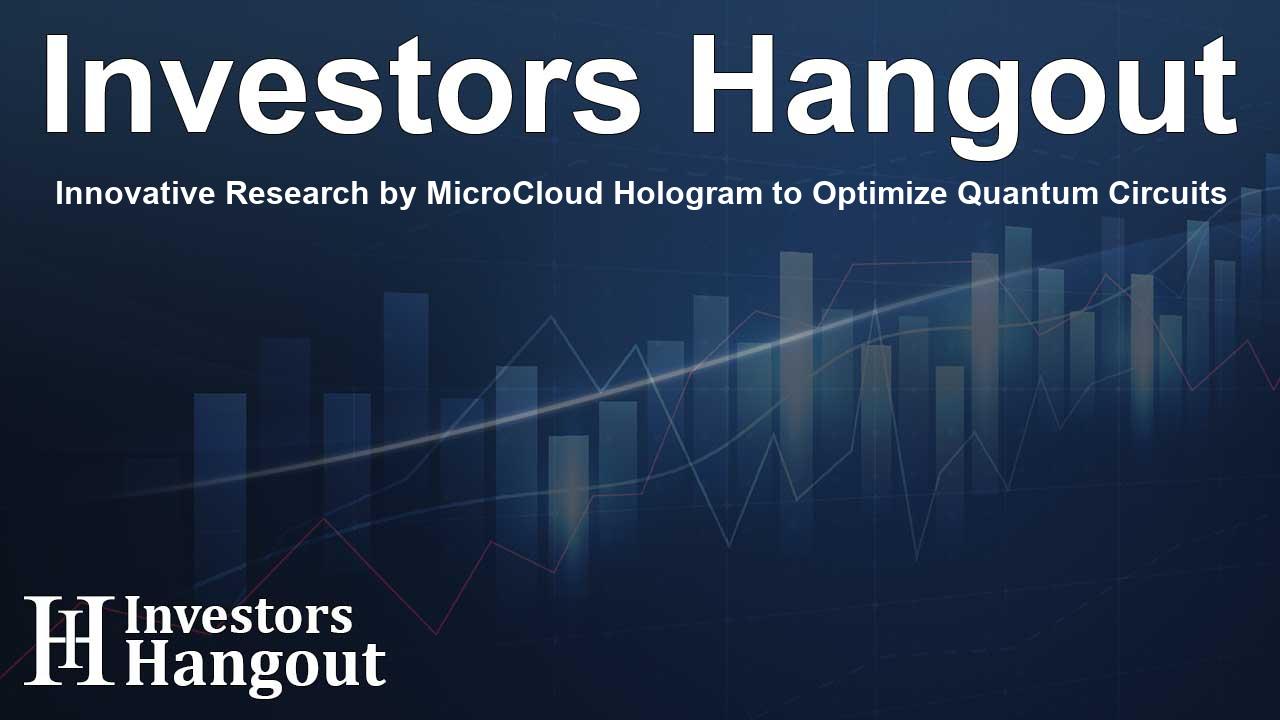Innovative Research by MicroCloud Hologram to Optimize Quantum Circuits

Promising Advances in Quantum Circuit Optimizations
MicroCloud Hologram Inc. (NASDAQ: HOLO) has made significant strides in the realm of quantum technology. Their recent research focuses on the low-cost implementation of quantum channels, discovering potential optimizations in the utilization of C-NOT gates within their newly proposed multi-model quantum circuit framework. This groundbreaking work provides the theoretical groundwork necessary for enhancing quantum channel design efficiency.
Understanding Quantum Circuit Decomposition
The process of quantum channel decomposition involves transforming abstract quantum state changes into specific sequences of quantum gates. A critical aspect of this transformation is minimizing the number of C-NOT gates while ensuring accurate functionality. MicroCloud Hologram's research introduces three innovative quantum circuit models: Quantum Circuit Model (QCM), Random Quantum Circuit Model (RandomQCM), and Measured Quantum Circuit Model (MeasuredQCM), each structured to expand operational flexibility in quantum operations.
Introducing the Quantum Circuit Model (QCM)
The first of its kind, QCM includes a systematic arrangement of single-qubit gates paired with C-NOT gates. By allowing the qubits to be reordered after executing the gate sequence, this model guarantees a deterministic pathway for implementing quantum channels. However, it operates within constrained parameters and primarily depends on quantum state evolution for achieving transformations.
Expanding Possibilities with RandomQCM
The RandomQCM model adds an exciting dimension by incorporating a degree of randomness in classical operations. This model allows for probabilistic adjustments in gate sequence design, which could enhance the efficiency of quantum operations significantly. Using classical randomness for qubit routing and gate selection, RandomQCM demonstrates notable advantages in managing stochastic quantum channels.
A Groundbreaking Approach with MeasuredQCM
Taking it a step further, the MeasuredQCM integrates measurement and conditional control, presenting a flexible approach to quantum circuit execution. By enabling real-time measurement during circuit operations, this model allows for dynamic adjustments based on feedback from measurements. This unique “measurement-feedback” mechanism holds promise for simplifying the decomposition of complex quantum channels.
Establishing Lower Bound Proofs
HOLO's rigorous research utilized entropy analysis from quantum theory to evaluate the minimum required counts of C-NOT gates across the three proposed models. Their findings indicate that for any quantum channel transitioning from m qubits to n qubits, there exists a fundamental lower bound correlated with the channel’s entanglement capacity and dimensions of the qubits involved.
Practical Implications of Circuit Decomposition
By deriving near-optimal circuit decomposition solutions, HOLO’s studies present valuable insights into practical applications. In their QCM framework, they managed to limit the number of C-NOT gates to approximately 1.5 times the theoretical lower limit. RandomQCM further closed this gap to about 1.2 times the lower bound with its probabilistic approach, while MeasuredQCM achieved a remarkable level of efficiency by nearing the theoretical lower bound in most use cases.
Challenges and Future Directions
Despite the promising results, HOLO’s methods face real-world challenges. In the MeasuredQCM model, measurement operations can lead to quantum state collapse, necessitating precise timing to safeguard critical quantum information. Furthermore, the complexity of conditional model operations requires swift real-time classical control, raising concerns about system engineering implementations. Nevertheless, advancements in quantum measurement technologies and classical-quantum interface designs are expected to facilitate progressive resolutions.
Conclusion and Vision Ahead
Through their comprehensive studies on innovative quantum circuit models, MicroCloud Hologram Inc. has illuminated the cost boundaries regarding C-NOT gates critical for quantum channel implementation. Notably, the MeasuredQCM approach offers a theoretical framework that could revolutionize quantum channel designs with minimal resource utilization, which is vital for transitioning quantum computing from experimentation into concrete real-world applications.
Frequently Asked Questions
What is MicroCloud Hologram Inc.?
MicroCloud Hologram Inc. is a technology service provider focused on advancing holographic technologies and quantum computing innovations.
What are quantum circuit models?
Quantum circuit models are frameworks for implementing quantum computations, allowing researchers to design and optimize quantum channels.
What is the significance of C-NOT gates?
C-NOT gates are essential in quantum computing as they are used to perform quantum state transformations and entanglements.
How does the RandomQCM model improve quantum operations?
RandomQCM incorporates classical randomness to enhance the flexibility and efficiency of gate sequence designs in quantum computations.
Where can I learn more about MicroCloud Hologram?
For more information, contact MicroCloud Hologram Inc. at IR@mcvrar.com or visit their website.
About The Author
Contact Owen Jenkins privately here. Or send an email with ATTN: Owen Jenkins as the subject to contact@investorshangout.com.
About Investors Hangout
Investors Hangout is a leading online stock forum for financial discussion and learning, offering a wide range of free tools and resources. It draws in traders of all levels, who exchange market knowledge, investigate trading tactics, and keep an eye on industry developments in real time. Featuring financial articles, stock message boards, quotes, charts, company profiles, and live news updates. Through cooperative learning and a wealth of informational resources, it helps users from novices creating their first portfolios to experts honing their techniques. Join Investors Hangout today: https://investorshangout.com/
The content of this article is based on factual, publicly available information and does not represent legal, financial, or investment advice. Investors Hangout does not offer financial advice, and the author is not a licensed financial advisor. Consult a qualified advisor before making any financial or investment decisions based on this article. This article should not be considered advice to purchase, sell, or hold any securities or other investments. If any of the material provided here is inaccurate, please contact us for corrections.
